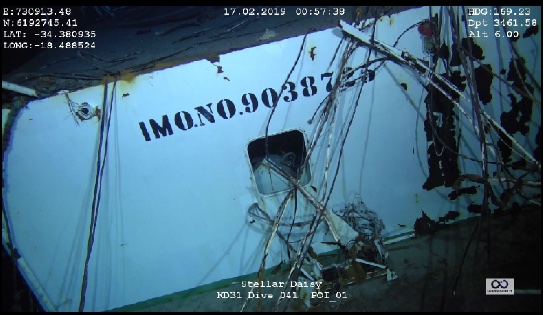
The Busan Regional Maritime Safety Tribunal ruled today that Polaris Shipping was guilty of neglect of maintenance which caused the sinking of the Stellar Daisy, a converted ore carrier that went down in the Atlantic off Uruguay in March 2017 with the loss of 22 lives.
The giant 1993-built ship was one of the most high-profile ship casualties this century with the families of the bereaved fighting multiple legal battles to ascertain what happened that caused it to capsize and sink so fast. Just two of the 24 crew onboard survived.
The tribunal said today Polaris Shipping installed an unauthorised wastewater storage device on the bottom of the ship and did not inspect or strengthen the ship’s hull.
The shipping company was supposed to conduct repairs to safely load cargo on the Stellar Daisy but let the ship set sail without reinforcement, the tribunal said.
The Marshall Islands flag issued its report into the sinking in April 2019, citing a catastrophic structural failure of the ship’s hull for the deadly disaster.
The ship – originally a VLCC – took on water and split in two very fast. Days later another 1993-built converted ore carrier belonging to Polaris had to reroute for Cape Town for repairs after a hull crack was discovered.
This then prompted the Busan-based owner to launch an urgent fleet wide series of inspections, which in turn saw a 1992-built converted ore carrier also head off to Cape Town to be fixed and in the years that followed all the company’s old converted ships were sold off.
VLOCs were converted from single-hull very large crude carriers in previous decades as a result of the dry bulk supercycle and the IMO regulation which mandated that all single hull tankers should be phased out by 2010.
With cheap and obsolete tanker tonnage in the market, investors eyed an opportunity to convert the ships into VLOCs and deploy them on long-term contracts of affreightment, often with a duration of 10 years.
The CEO of Polaris Shipping was sentenced by an appellate court in 2021 to six months in prison for violating the Ship Safety Act and is now waiting for the final verdict from the Supreme Court.
In 2022, seven people, including the CEO, were indicted on manslaughter by negligence charges and the related trials are still in progress.
“The sinking of MV Stellar Daisy continues to be a profound tragedy for the affected families and the broader public,” Kim Kwang-su, a family member of one of the missing crewmembers, told Splash.

Am I missing something here?
Where are the individuals which held office as technical authorities in the Classification Societies that signed off these manslaughter machines? The Flag authorities that empowered these ROs? Why are the commercial persons that relied on all these so-called Authorities the ones going to jail alone?
In my view, classification society is one gatekeeper and not only gatekeeper. Furthermore, the classification society has very minimal control over how operator operates their vessel.